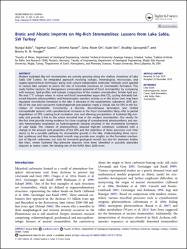Biotic and Abiotic Imprints on Mg-Rich Stromatolites: Lessons from Lake Salda, SW Turkey

View/
Date
2020Author
Balci, NurgulGunes, Yagmur
Kaiser, Jerome
Ön, Sena Akçer
Eris, Kadir
Garczynski, Bradley
Horgan, Briony H. N.
Metadata
Show full item recordAbstract
Modern hydrated Mg rich stromatolites are actively growing along the shallow shorelines of Lake Salda (SW Turkey). An integrated approach involving isotopic, mineralogical, microscopic, and organic/geochemical techniques along with culture-independent molecular methods were applied to various lake samples to assess the role of microbial processes on stromatolite formation. This study further explores the biosignature preservation potential of fossil stromatolites by comparing with textures, lipid profiles and isotopic composition of the modern stromatolites. Similar lipid profile and delta C-13 isotope values in active and fossil stromatolites argue that CO2 cycling delicately balanced between photosynthetic and heterotrophic (aerobic) activity as in the active ones may have regulated stromatolite formation in the lake. A decrease in the exopolymeric substances (EPS) profile of the mat and concurrent hydromagnesite precipitation imply a critical role for EPS in the formation of stromatolite. Consistently, a discrete, discontinuous lamination and clotted micropeloidal textures with cyanobacterial remnants in the fossil stromatolites likely refer to partial degradation of EPS, creating local nucleation sites and allowing precipitation of hydrated Mg minerals and provide a link to the active microbial mat in the modern stromatolites. Our results for the first time provide strong evidence for close coupling of cyanobacterial photosynthesis and aerobic heterotrophic respiration on hydromagnesite textures involved in the stromatolite formation of Lake Salda. The creation of photosynthesis induced high-pH conditions combined with a change in the amount and properties of the EPS and the repetition of these processes over time seems to be a possible pathway for stromatolite growth in the lake. Understanding these microbial symbioses and their mineralized records may provide new insights on the formation mechanism of Mg-rich carbonates not only for terrestrial geological records but also for planetary bodies like Mars, where hydrated Mg-carbonate deposits have been identified in possible paleolake deposits at Jezero crater, the landing site of the NASA Mars 2020 rover.

















